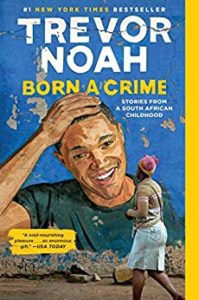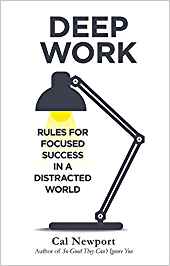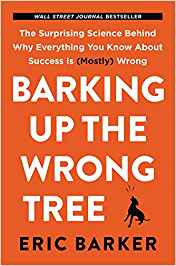These 3 books shifted my perspective.
And none are about pitching for investment.
I’m a voracious reader. Kindle recently informed me that I’ve already read 65 books this year alone!
Books continuously inspire me and influence my life and work. For this month’s blog post, I wanted to share a few of the recent books I’ve read that have had a strong impact on me lately.
They’re not directly related to pitching for investment, but they are related to life and could help us work better.
The first opened my eyes to a culture I thought I knew more about; the second, on how to focus in a distracted world; and the third, to a new understanding of “success” and how our weaknesses, in the right context, can actually become our biggest strengths.
A success story you won’t soon forget.

Born a Crime, by the talk show host Trevor Noah, is the surprising personal story of a well-known celebrity who went from extreme struggle to phenomenal success.
What’s really fascinating about this book — if you haven’t read it, and have only seen Noah on The Daily Show — is that you would never have guessed what his life was like growing up in South Africa.
You immediately understand how different his upbringing was from anything many of us in Western developed countries have experienced.
I’m so impressed with how he runs the Daily Show. He’s got his finger on the pulse of the economy, politics, entertainment, sports, fashion — he’s right on top of and commenting on all the nuances of the American culture. He’s funny, and he understands it from an outsider’s point of view.
But what impresses me most is that he understands the nuances as if he were an insider.
I know how hard it is to understand the nuances of a culture where you’re living when you haven’t grown up there. I’ve been in Spain for the last 4 years, and I was in Amsterdam for 4 years before that. I’ve lived in France for a year, and in Ecuador for about 8 months.
I pride myself on grasping the nuances of different business cultures when I’m pitch coaching. I understand my American culture well. But I can’t say that I can easily comment on what the Dutch, French, Spanish or Catalans have been through on a more personal, political, or cultural level. Not to mention their humor.
I’m in awe of Noah’s mastery of the nuances of the American culture.
His book is also extremely well written. You can hear his voice in the stories he tells. His life in South Africa was fascinating and opens an intimate window into his experience of Apartheid. He shares his stories with a sober realism, sprinkled with his signature dark humor that makes us want to keep reading. I heartily recommend getting the audiobook, told from his voice.
It’s a quick read, and one of the most eye-opening, educational, and compelling memoirs I’ve ever encountered. I’m blown away by how well he tells his story, raising our awareness about Apartheid with compassion.
Learning to focus in a world of distraction.
My next book is Deep Work: Rules For Focused Success In A Distracted World by Cal Newport.
Deep Work is defined as:
professional activities performed in a state of distraction-free concentration that push your cognitive capabilities to their limit. These efforts create new value, improve your skill, and are hard to replicate.
Newport gives examples of influential thinkers who did their best work in isolation, free from distraction: Carl Jung at Bollingen Tower near the banks of Lake Zurich; Bill Gates’ “Think Weeks”; Woody Allen, who wrote 44 films on a manual typewriter; and many others.

I actually wrote this blog while on a retreat in France at the Chateau de Lalande. I’ve wanted to write a book for a number of years and finally started writing it when while at Lalande. The purpose was to take 5 days away from our normal lives, so we could go in-depth into a project and really be able to focus. Deep Work was a prerequisite for us to read before coming on the retreat.
In the book, the author writes that our highest-quality work is produced not only when we have more time, but perhaps more importantly, when we can achieve an intensity of focus in the time that we have.
The author also talks about busy-ness as a proxy for productivity. I think that’s partly what has been going on in my life – I’m incredibly busy, and I’m productive when it comes to delivering what my clients need. But in terms of some other life goals, I’ve seldom had time to pursue them.
Newport writes a lot about network tools – like email, social media, the Internet, and news or other infotainment sites – which are distracting us from our ability to concentrate and degrading our capacity to remain focused. Ultimately, they are keeping us from doing our best work.
To really profit from “the deep life”, we must make drastic changes to our habits, and tame our use of electronic communication ‘tools’, which are taking up to 60% of our workweek. According to a McKinsey study he sites, nearly 30% of a worker’s time is spent reading and answering emails alone.
One tip Newport offers (among many) is committing to what he calls fixed-schedule productivity, in which we schedule every minute of our day into blocks, and we don’t work in the evenings or on weekends.
He argues that we need to embrace boredom in order to be able to resist distraction. In the time we have, we can read, exercise, spend time with our family, and rest.
He goes as far as suggesting that we meditate productively when we’re out walking the dog, jogging, or commuting: focusing on solving a single work-related problem, while moving around outdoors, and free from other distractions.
This is one of the many mental exercises he explains will help us sharpen our ability to work deeply. I won’t get into every one of them here – just read the book, in all your extra time 🙂
A counter-intuitive approach to success.
Eric Barker called “Deep Work” the “superpower of the 21st century.” He wrote Barking Up the Wrong Tree, which is the third book I want to share with you.
Barker is a well-known business author and blogger, whose science-based book is counter-intuitive to what we assume we need to do in order to be successful in life.
He came up with four different feelings necessary for us to have, in order to be and feel “successful”:
- An Achievement – you have to feel like your winning
- Legacy – you have to feel like you’re influencing others in a positive way
- Significance – you have to feel like you’re needed by your friends, family, and coworkers
- Happiness – you’re enjoying life and doing things that give you joy and which you find fun

One of the things he said that struck me is that if you work in an office, having a mild form of Asberger’s could hurt your chances of success because you will not be clued in to the social interactions of your coworkers.
However, having a mild form of Asberger’s can also be an advantage, for instance in Silicon Valley, because people with Asbergers are not intimidated by others, and they’re more likely to challenge social norms.
An example of this is Greta Thunberg. She apparently has a mild form of Asberger’s, and she’s doing both of those things. As an entrepreneur, you need to be able to do both, too.
He talks about identifying your so-called flaws and paying attention to situations in which they can become strengths.
His message is basically that your flaws, in the right environments, can become signature attributes.
You have to be able to see clearly who you are and identify what you think your weaknesses are in different environments. As in the example of Silicon Valley vs. corporations, the context matters.
It took me a while to be able to identify my signature strengths – some came to light much more slowly than others.
Once I was clear, I began to focus solely on Pitch Coaching. This has allowed me to feel much happier because I’m influencing people and making a difference for good. I enjoy it, people need what I have to offer, and I know I’m getting successful outcomes for my clients.
Knowing who I am, and putting my signature strengths to use in the right context has made me feel successful in what I’m doing and in how I’m approaching my clients and my life.
Barking Up the Wrong Tree really allows you to step back and look at yourself from a different perspective, instead of the narrow path that most of us have been encouraged to follow. It allows you to see that you do have the right strengths, and it guides you on how to find the right context.
There’s a saying that I always talk about, which is from the children’s story The Ugly Duckling. Many of us feel like ugly ducklings, and we just have to go and find our swans. And that’s what Barker helps us do.





